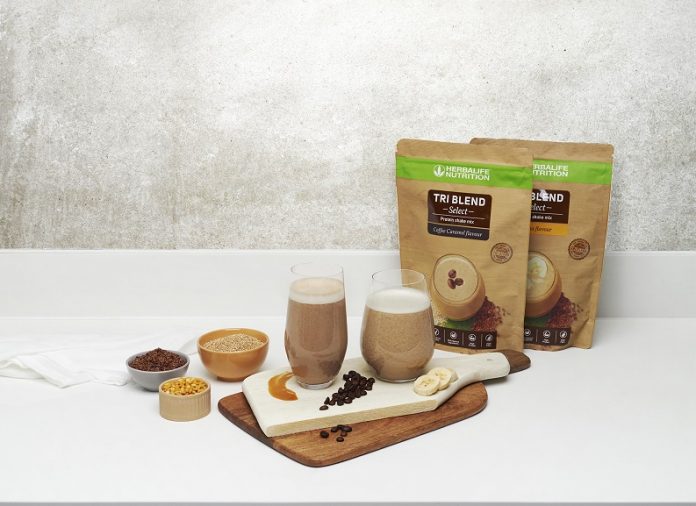How it’s made
For Tri Blend premium vegan1, ingredients like quinoa, flaxseed and pea were selected. Together, all the ingredients in the product deliver a protein source, vitamin C and 7 key minerals.
Plant-based protein
Using plant-based instead of animal-based proteins, like milk, makes the composition of the product different. Protein is a composition of smaller molecules called amino acids.
Some of these amino acids can’t be produced by the body itself. The nine amino acids that humans cannot synthesise are phenylalanine, valine, threonine, tryptophan, methionine, leucine, isoleucine, lysine, and histidine. These are called essential amino acids and must be provided by the diet in a certain proportion. In many animal-based sources, like milk protein, these amino acids are provided in the right amount and proportion.
Plant-proteins (with some exceptions) tend to be incomplete, lacking different essential amino acids. For example, a plant-protein source can be low in lysine, whereas another one is low in methionine.
However, mixing complementary sources of plant-protein helps us to obtain all the essential amino acids in their adequate amounts to have a complete protein. Therefore, together, the ingredients of Tri Blend provide a source of protein. The product is also suitable for vegans and can be part of a plant-based diet.
Why Tri Blend is a great snack
First, consuming a protein snack, such as Tri Blend, may be a great way to help meet protein recommendations. It is also a better alternative to common low-nutrient, high-energy density snacks. Moreover, it’s a convenient way to increase plant protein consumption or, to help us switch to a more plant-based protein diet.
Something good for the planet
Compared to animal-based diets, plant-based alternatives seem to also have some benefits for the planet.
Vegetarianism is the practice that excludes meat, meat products, poultry and fish from the diet. There are several variants of the diet, some of which also exclude eggs or dairy. Veganism is a philosophy and compassionate lifestyle. The objective of this diet seeks to exclude the use of animals for food, clothing, or any other purpose. Vegans don’t use or consume animal products of any kind including honey.
For more information, visit www.herbalife.co.za
References: Appleby, P. N., & Key, T. J. (2016). Conference on ‘The future of animal products in the human diet: health and environmental concerns’ Symposium 3: Alternatives to meat. The long-term health of vegetarians and vegans. Proceedings of the Nutrition Society, 75, 287–293. Melina, V., Craig, W., & Levin, S. (2016). Position of the Academy of Nutrition and Dietetics: Vegetarian Diets. J Acad Nutr Diet, 116(12), 1970-1980. doi:10.1016/j.jand.2016.09.025






